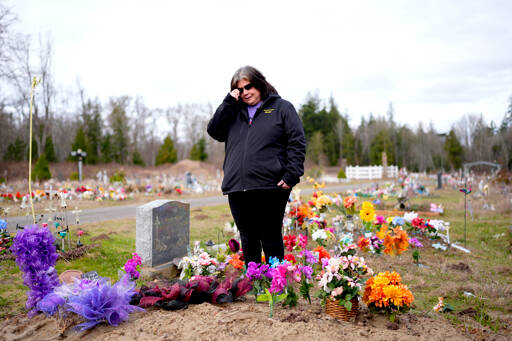BELLINGHAM — Evelyn Jefferson walks deep into a forest dotted with the tents of unhoused Lummi Nation tribal members and calls out names. When someone appears, she and a nurse hand out the opioid overdose reversal medication naloxone.
Jefferson, a tribal member herself, knows how critical these kits are: Just five months ago, her own son died of an overdose from a synthetic opioid that’s about 100 times more potent than fentanyl. The 37-year-old’s death was the fourth related to opioids in four days on the reservation.
“It took us eight days to bury him because we had to wait in line, because there were so many funerals in front of his,” said Jefferson, crisis outreach supervisor for Lummi Nation. “Fentanyl has really taken a generation from this tribe.”
A bill before the state Legislature would bring more state funding to tribes like Lummi that are trying to keep opioids from taking the next generation too. The state Senate unanimously approved a bill last week that is expected to provide nearly $8 million total each year for the 29 federally recognized tribes in Washington, funds drawn in part from a roughly half-billion-dollar settlement between the state and major opioid distributors.
The approach comes as Native Americans and Alaska Natives in Washington die of opioid overdoses at five times the state average, according to 2021-2022 Centers for Disease Control and Prevention data that includes provisional numbers. The rate in Washington is one of the highest in the U.S. and more than three times the rate nationwide — but many of the Indigenous nations in the state lack the funding or medical resources to fully address it.
Lummi Nation, like many tribes, faces an additional challenge when it comes to keeping outside drug dealers off their land: A complicated jurisdictional maze means tribal police often can’t arrest non-tribal members on the reservation.
“What do we do when we have a non-Lummi, predatory drug dealer on our reservation with fentanyl, driving around or on their property and are selling drugs?” said Anthony Hillaire, tribal chairman.
Against the backdrop, tribes such as the Lummi Nation, about 100 miles north of Seattle, say the proposed funding — while appreciated — would barely scratch the surface. The tribe of about 5,300 people on the shores of the Salish Sea has already suffered nearly one overdose death a week this year.
Lummi Nation needs $12 million to fully finance a 16-bed, secure medical detox facility that incorporates the tribe’s culture, Hillaire said, and money to construct a new counseling center after damage from flooding. Those costs alone far exceed the annual total that would be designated for tribes under the legislation. The Senate has proposed allotting $12 million in its capital budget to the facility.
“We’re a sovereign nation. We’re a self-governed tribe. We want to take care of ourselves because we know how to take care of ourselves,” he said. “And so we usually just need funding and law changes — good policies.”
The proposed measure would earmark funds deposited into an opioid settlement account, which includes money from the state’s $518 million settlement in 2022 with the nation’s three largest opioid distributors, for tribes battling addiction. Tribes are expected to receive $7.75 million or 20 percent of the funds deposited into the account the previous fiscal year — whichever is greater — annually.
Republican state Sen. John Braun, one of the bill’s sponsors, has said he envisions the funds being distributed through a grant program.
“If this ends up being the wrong amount of money or we’re distributing it inequitably, I’m happy to deal with this,” he said. “This is just going to get us started and make sure we’re not sitting on our hands, waiting for the problem to solve itself.”
Opioid overdose deaths for Native Americans and Alaska Natives have increased dramatically in the past few years in Washington, with at least 100 in 2022 — 75 more than in 2019, according to the most recent numbers available from the state Department of Health.
In September, Lummi Nation declared a state of emergency over fentanyl, adding drug-sniffing dogs and checkpoints, while revoking bail for drug-related charges.
The tribe has also opened a seven-bed facility to help members with withdrawal and get them on medication for opioid use disorder, while providing access to a neighboring cultural room where they work with cedar and sage. In its first five months, the facility treated 63 people, the majority of whom are still on the medication regimen today, said Dr. Jesse Davis, medical director of the Lummi Healing Spirit Opioid Treatment program.
But truly thwarting this crisis must go beyond just Lummi Nation working on its own, said Nickolaus Lewis, Lummi council member.
“We can do everything in our power to protect our people. But if they go out into Bellingham, they go out anywhere off the reservation, what good is it going to do if they have different laws and different policies, different barriers?” he said.
The tribe has urged Gov. Jay Inslee and President Joe Biden to declare states of emergency in response to the opioid crisis to create a bigger safety net and drive additional vital resources to the problem.
In the encampment in Bellingham, Jefferson estimates there are more than 60 tribal members, some she recognizes as her son’s friends, while others are Lummi elders. She suspects many of them left the reservation to avoid the tribe’s crackdown on opioids.
When she visits them, her van filled with food, hand warmers and clothing to hand out, she wears the shirt her niece gave her the day after her son died. It reads, “fight fentanyl like a mother.”
“It’s a losing battle, but, you know, somebody’s got to be there to let them know — those addicts — that somebody cares,” Jefferson said. “Maybe that one person will come to treatment because you’re there to care.”

